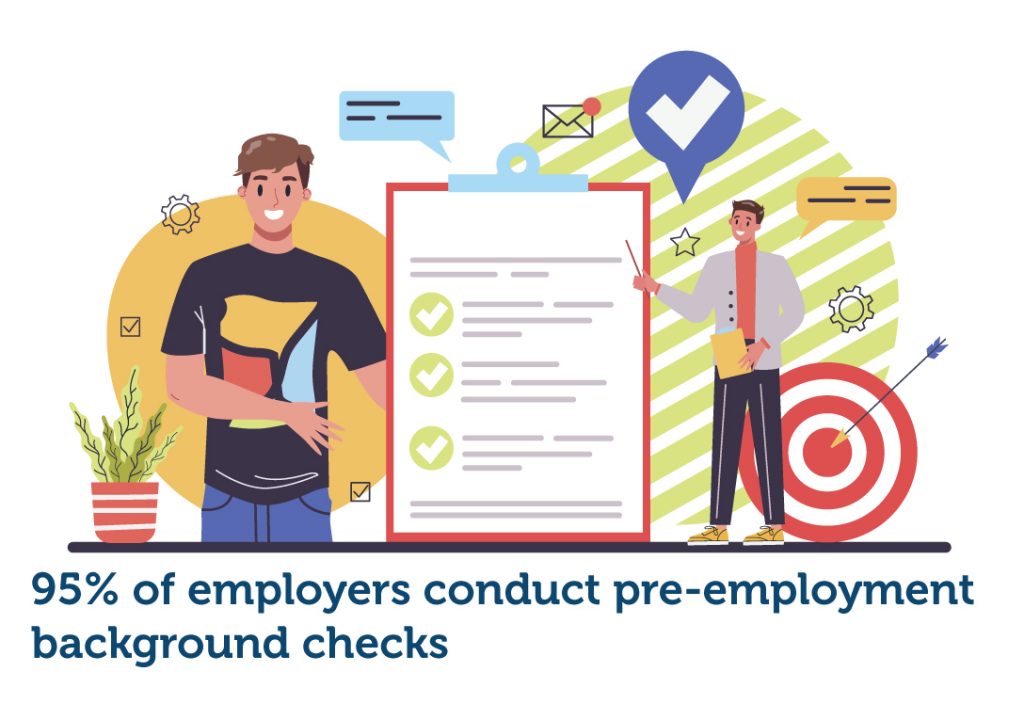
What’s Going to Happen to Remote Work?
In the aftermath of the pandemic, the perception and role of remote work keep changing. To understand what lies ahead, let’s look at the biggest remote work trends for 2024.

Many professionals have polished resumes and give excellent interviews, yet still have their applications rejected due to their background. As a matter of fact, learning what shows up during your background check is one of the most overlooked aspects of the hiring process.
With all the time and effort put into the job search process, business owners and candidates need to understand why a background screening process is essential to successful recruitment.
Below, we cover everything about background checks and answer the question: what do employee background checks look for?
So, what is a background check?
A background check is the standard way for employers to verify a candidate’s background and qualifications before extending them a formal job offer. This process can also highlight potential red flags by checking for criminal records, credit history, driving history, and more.
However, employers must notify candidates in writing if they intend to obtain a background report, and they must also get a candidate’s written consent.
If the business owner uses a third-party background check company to conduct the screening, The Fair Credit Reporting Act (FCRA) ensures it’s lawful. If anything in the report causes an employer not to hire a candidate, they must provide a copy of the report to the job candidate.
According to Shortlister’s “Background Check Statistics” article, as many as 95% of employers conduct pre-employment background checks.
However, it is crucial to implement a background check policy before you run a background check. In this policy, you should outline when it is appropriate to conduct a background check and how to determine which screenings to include.

When it comes to employment background checks, every employer approaches things differently.
Background verification checks can be customized depending on the size and resources, the industry, and the open roles. There are many types of background checks an employer can order, all of which serve different purposes and data types from various sources.
Each additional inquiry costs more and can quickly add up.
Therefore, employers only request information relevant to the role and within the guidelines of state regulations of the employee’s location.
HR managers ask for background screenings to ensure they choose the best employee to contribute to the company, but they also need to ensure they protect the business from individuals who show reckless or fraudulent behaviors in the workplace.
Comprehensive pre-hire background checks have many benefits, such as increasing applicant quality, hiring the right candidate, reducing workplace accidents and violence, and avoiding company losses and negative publicity.
Checking the background of potential new hires mitigates the chances of a disastrous hire and leads to an increase in high-quality job applications.
Many companies report immediate improvements in job applicants once they begin conducting regular background checks.
All in all, pre-employment checks lead to the following:

The type of screening you will receive depends on the job position and the employer. Your credit may be screened if your job is in the finance sector. If you are a taxi driver, your driving records will be checked.
So, what do employee background checks look for, and what does a background check show?
After answering “what do employee background checks look for,” you might wonder what information doesn’t appear in a standard background check.
Here’s the information that’s less readily available on most checks or may require specialized services:
Recruiters can learn about applicants from their resume information and what is shared during interviews. However, there’s also plenty of missing information that’s useful or necessary to know before deciding to extend an offer to a candidate.
For instance, a criminal offense can indicate that an individual may be prone to violence. Additionally, many late payments, loans in default, or bad credit history may be considered a liability.
Background screenings are essential for employers as they can protect themselves from future negligent hiring lawsuits. Employers can be held responsible for their actions if they are not diligent about verifying a candidate’s background.
Moreover, hiring, onboarding, and training a new employee is a costly process.
Firing an employee can significantly disrupt a business’s operations, whether a part-time or full-time worker. As a result, background screenings are a valuable tool to avoid bad hires and identify any red flags before it’s too late.

Without a doubt, the hiring process is expensive and time-consuming.
That’s why there is even more pressure to hire the right candidate when it comes to small businesses, as lawsuits related to negligent hiring can cost a fortune and ruin the company’s future.
While many start-ups and small business owners understand the purpose of background checks, many still shy away from them due to the costs of perceived complexity. However, one mistake for small businesses can jeopardize the entire company and affect the well-being of staff.
Many businesses try to handle background checks independently but may only find limited and inaccurate information.
Instead of focusing on higher-value business operations, business owners would have to check their state’s specific laws and regulations before they conduct a background check.

Understandably, background checks can make even the most stellar applicants nervous, as employers can look into several personal facts.
You may be wondering, how long does an employment background check take?
Typically, background checks take between two to five business days. However, every individual’s history is unique and different factors can prolong this timeframe.
Once the initial screening is completed, there are no federal or state laws that mandate re-screening. However, a lot can change in five or ten years.
Are you confident that your clients and business are not exposed to any risks?
Are you sure your business will not be liable for negligent hiring practices?
For these reasons, most workplace safety and liability experts recommend that companies re-screen every two to five years. Some examples where re-screening may be necessary include:
By now, the answer to what do employee background checks look for and their significance in the recruitment process should be clear.
Background checks are a vital part of the vetting process as they provide a detailed and wide-reaching view of a candidate’s past. They can protect the company and its reputation and set the foundation for a safe work environment for all.
Browse our curated list of vendors to find the best solution for your needs.
Subscribe to our newsletter for the latest trends, expert tips, and workplace insights!

In the aftermath of the pandemic, the perception and role of remote work keep changing. To understand what lies ahead, let’s look at the biggest remote work trends for 2024.

Following a wave of mass resignations, employees unsatisfied with their new jobs faced the “Great Regret.” Now, a new workplace trend is on the rise.

With rising gas prices, soaring car maintenance and used vehicle costs, commuting to the office has become a costly burden that drains employees’ finances, productivity, and satisfaction—making commuter benefits a vital solution for employers.

How does workplace design affect productivity? Can the corporate workplace be a place that offers both meaning and efficiency?
Used by most of the top employee benefits consultants in the US, Shortlister is where you can find, research and select HR and benefits vendors for your clients.
Shortlister helps you reach your ideal prospects. Claim your free account to control your message and receive employer, consultant and health plan leads.